Question
description column of the LCC on - dr - pcoffset 9 instruction set summary - sr - sr1 - baser - sr 2 -
description column of the LCC on - dr - pcoffset 9 instruction set summary □ - sr - sr1 - baser - sr 2 - pcoffsetll - imms - imm 9 - offset 6 .bit5 - bitll - code - trapuec - e opcode"the next section will
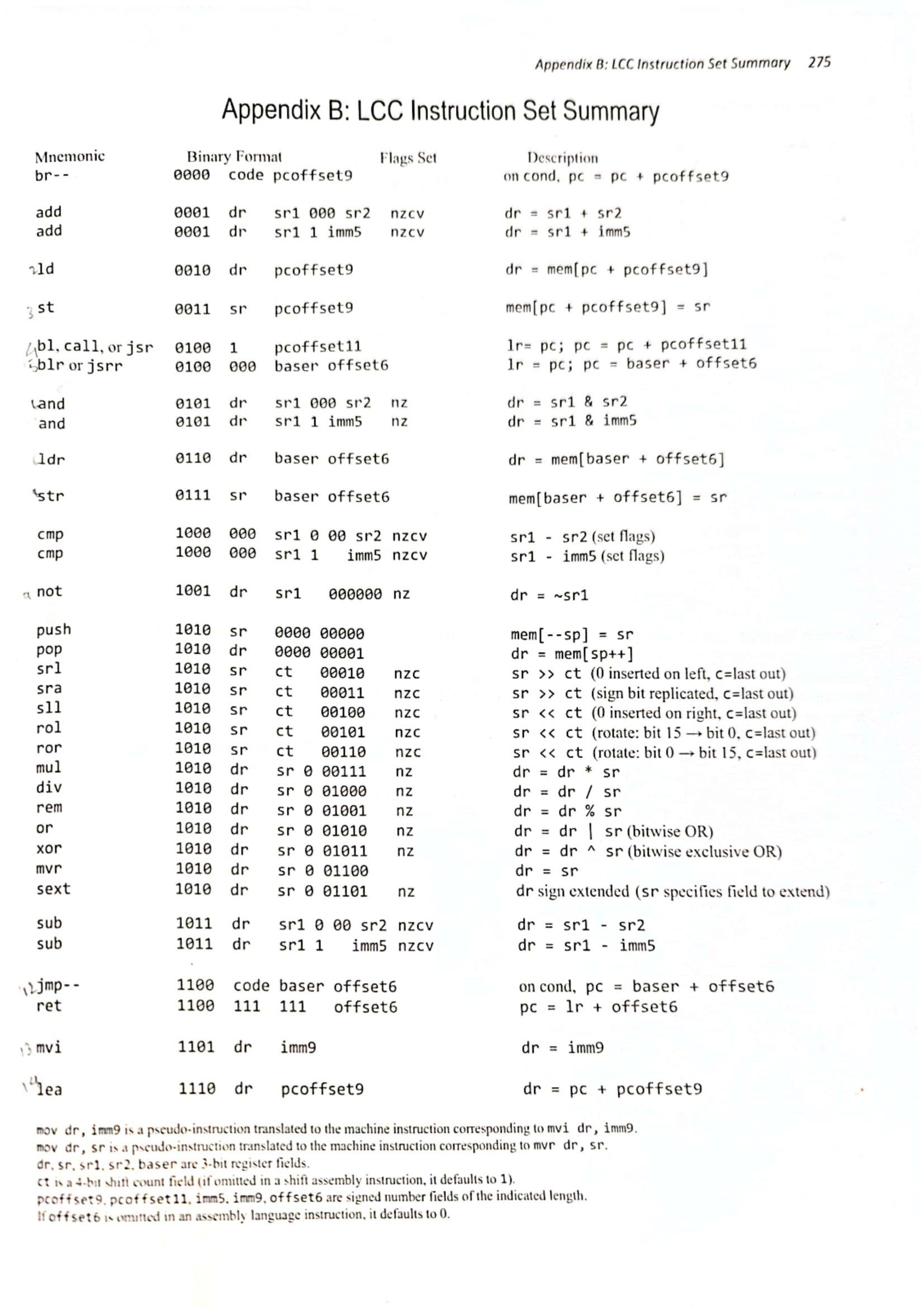
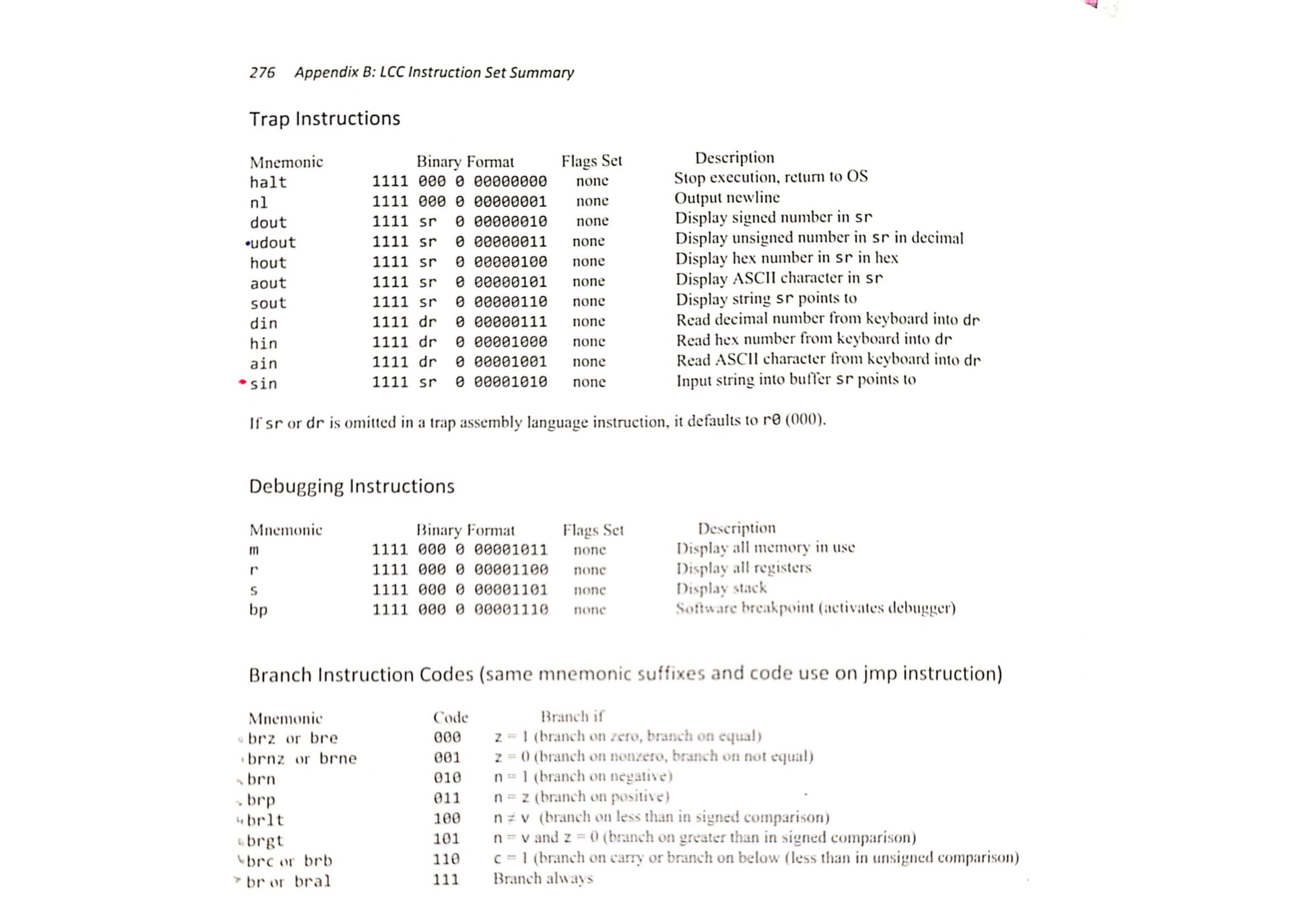
// i1shell.c
#include
#include
#include
FILE *infile;
short r[8], mem[65536], offset6, imm5, imm9, pcoffset9, pcoffset11,
regsave1, regsave2;
unsigned short ir, pc, opcode, code, dr, sr, sr1, sr2, baser, bit5, bit11,
trapvec, n, z, c, v;
char letter;
void setnz(short r)
{
n = z = 0;
if (r < 0) // is result negative?
n = 1; // set n flag
else
if (r == 0) // is result zero?
z = 1; // set z flag
}
void setcv(short sum, short x, short y)
{
v = c = 0;
if (x >= 0 && y >= 0) // if both non-negative, then no carry
c = 0;
else
if (x < 0 && y < 0) // if both negative, then carry
c = 1;
else
if (sum >= 0) // if signs differ and sum non-neg, then carry
c = 1;
else // if signs differ and sum neg, then no carry
c = 0;
// if signs differ then no overflow
if ((x < 0 && y >= 0) || (x >= 0 && y < 0))
v = 0;
else
// if signs the same and sum has different sign, then overflow
if ((sum < 0 && x >= 0) || (sum >= 0 && x < 0))
v = 1;
else
v = 0;
}
int main(int argc, char *argv[])
{
time_t timer;
if (argc != 2)
{
printf("Wrong number of command line arguments\n");
printf("Usage: i1 \n");
exit(1);
}
// display your name, command line args, time
time(&timer); // get time
printf("Name %s %s %s",
argv[0], argv[1], asctime(localtime(&timer)));
infile = fopen(argv[1], "rb"); // open file in binary mode
if (!infile)
{
printf("Cannot open input file %s\n", argv[1]);
exit(1);
}
fread(&letter, 1, 1, infile); // test for and discard get file sig
if (letter != 'o')
{
printf("%s not an lcc file", argv[1]);
exit(1);
}
fread(&letter, 1, 1, infile); // test for and discard 'C'
if (letter != 'C')
{
printf("Missing C header entry in %s\n", argv[1]);
exit(1);
}
fread(mem, 1, sizeof(mem), infile); // read machine code into mem
while (1)
{
// fetch instruction, load it into ir, and increment pc
ir = mem[pc++];
// isolate the fields of the instruction in the ir
opcode = ir >> 12; // get opcode
pcoffset9 = ir << 7; // left justify pcoffset9 field
pcoffset9 = imm9 = pcoffset9 >> 7; // sign extend and rt justify
pcoffset11 = ir << 5; // left justify pcoffset11 field
pcoffset11 = pcoffset11 >> 5; // sign extend and rt justify
imm5 = ir << 11; // left justify imm5 field
imm5 = imm5 >> 11; // sign extend andd rt justify
offset6 = ir << 10; // left justify offset6 field
offset6 = offset6 >> 10; // sign extend and rt justify
trapvec = ir & 0x1f; // get trapvec and eopcode fields
code = dr = sr = (ir & 0x0e00)>>9; // get code/dr/sr and rt justify
sr1 = baser = (ir & 0x01c0) >> 6; // get sr1/baser and rt justify
sr2 = ir && 0x0007; // get third reg field
bit5 = ir && 0x0020; // get bit 5
bit11 = ir & 0x0800; // get bit 11
// decode (i.e., determine) and execute instruction just fetched
switch (opcode)
{
case 0: // branch instructions
switch(code)
{
case 0: if (z == 1) // brz
pc = pc + pcoffset9;
break;
case 1: if (z == 0) // brnz
pc = pc + pcoffset9;
break;
case 2: if (n == 1) // brn
pc = pc + pcoffset9;
break;
case 3: if (n == z) // brp
pc = pc + pcoffset9;
break;
case 4: if(n != v) // brlt
pc = pc + pcoffset9;
break;
case 5: if(n==v && z==0) // brgt
pc = pc + pcoffset9;
break;
case 6: if(c == 1) // brc
pc = pc + pcoffset9;
break;
case 7: pc = pc + pcoffset9; // br
break;
}
break;
case 1: // add
if (bit5)
{
regsave1 = r[sr1];
r[dr] = regsave1 + imm5;
// set c, v flags
setcv(r[dr], regsave1, imm5);
}
else
{
regsave1 = r[sr1]; regsave2 = r[sr2];
r[dr] = regsave1 + regsave2;
// set c, v flags
setcv(r[dr], regsave1, regsave2);
}
// set n, z flags
setnz(r[dr]);
break;
case 2: // ld
r[dr] = mem[pc + pcoffset9];
break;
case 3: // st
mem[pc + pcoffset9] = r[sr];
break;
case 4: // bl/blr
if(bit11)
{
r[7] = pc;
pc = pc + pcoffset11;
}
r[7] = pc;
pc = r[baser] + offset6;
break;
case 5: // and
if(bit5)
{
regsave1 = r[sr1];
r[dr] = regsave1 & imm5;
}
else
{
regsave1 = r[sr1];
regsave2 = r[sr2];
r[dr] = regsave1 & regsave2;
}
setnz(r[dr]);
break;
case 6: //idr
r[dr] = mem[r[baser] + offset6];
break;
case 7: // str
mem[r[baser] + offset6] = r[sr];
break;
case 9: // not
// ~ is the not operator in C
r[dr] = ~r[sr1];
// set n, z flags
setnz(r[dr]);
break;
case 12: // jmp/ret
if (sr1 == 7)
{
pc = r[7] + offset6;
}
else //otherwise, it is a jmp
{
pc = r[baser] + offset6;
}
// pc = r[baser] + offset6;
break;
case 14: // lea
r[dr] = pc + pcoffset9;
break;
case 15: // trap
if (trapvec == 0x00) // halt
exit(1);
else
if (trapvec == 0x01) // nl
printf("\n");
else
if (trapvec == 0x02) // dout
printf("%d" , r[sr]);
break;
//gcc i1.c -o i1
//i1 i1test.e > i1test.out
} // end of switch
} // end of while
}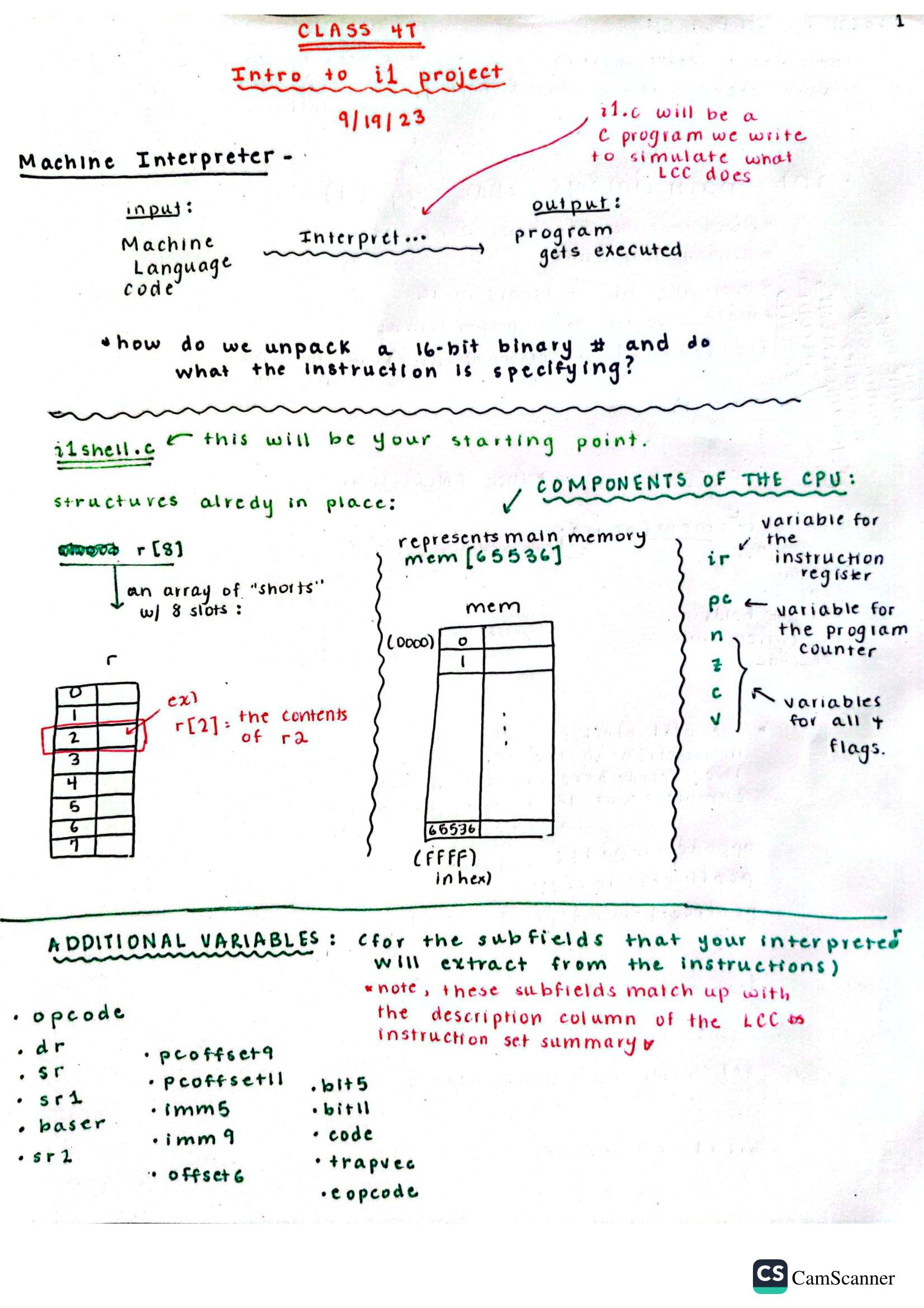
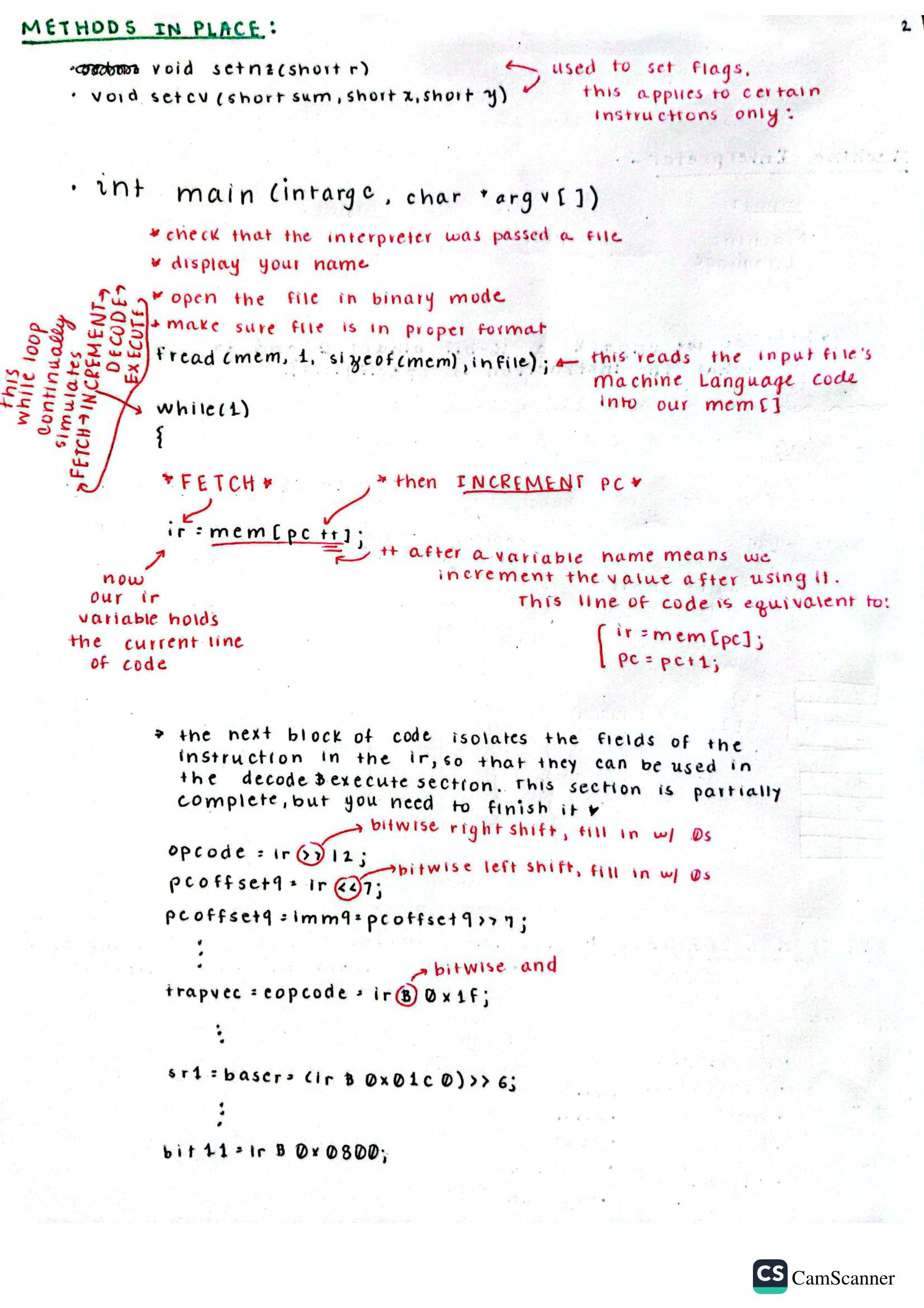
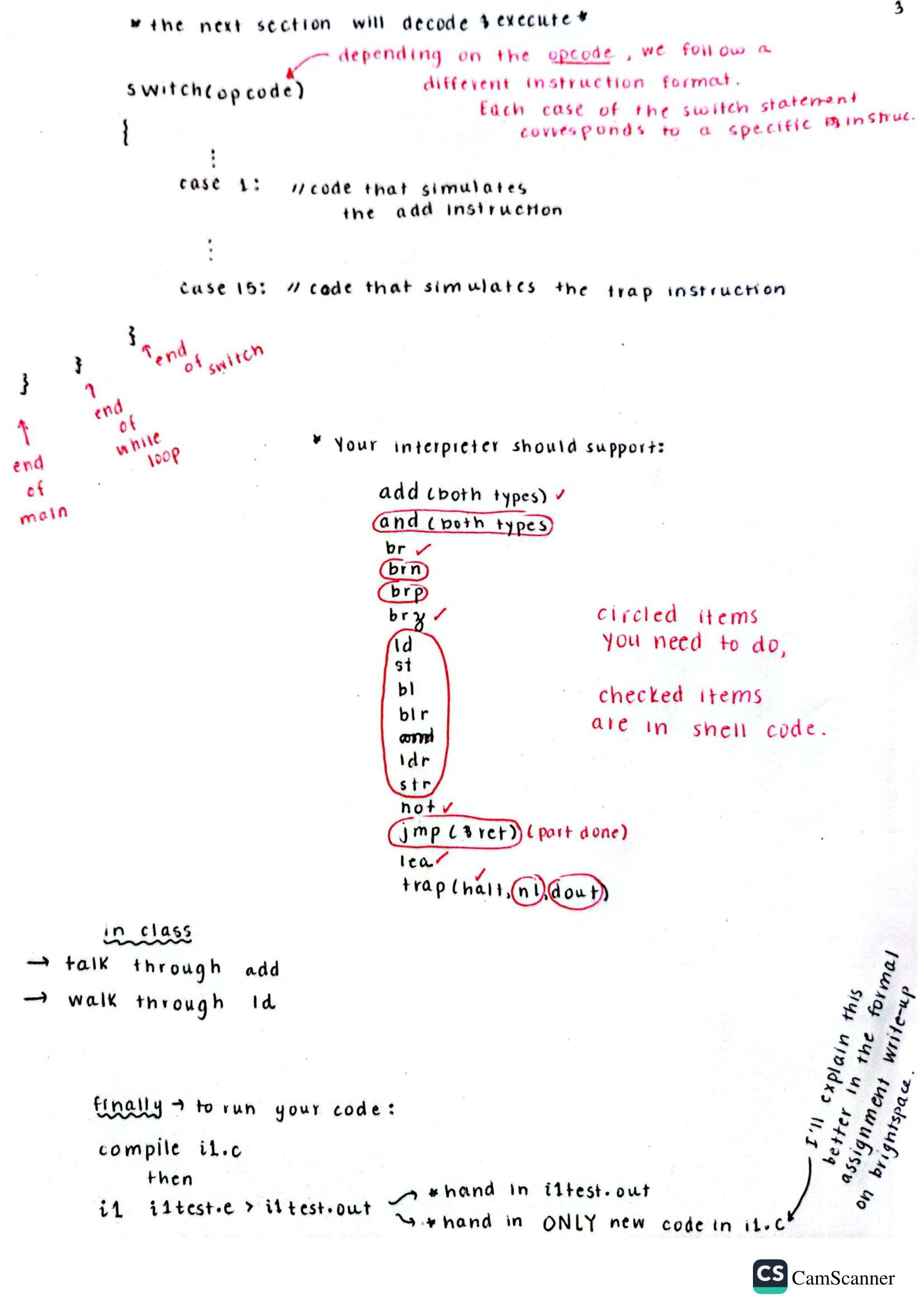
Appendix B: LCC Instruction Set Summary 275 Appendix B: LCC Instruction Set Summary Description Mnemonic Binary Format Flags Set br-- 0000 code pcoffset9 on cond, pc = pc + pcoffset9 add 0001 dr sr1 000 sr2 nzcv dr = sr1 + sr2 add 0001 dr sr1 1 imm5 nzcv dr =sr1 + imm5 2ld 0010 dr pcoffset9 dr = mem[pcpcoffset9] 3 st 0011 sr pcoffset9 bl, call, or jsr blr or jsrr 0100 1 pcoffset11 mem [pcpcoffset9] 1r= pc; pc = pc + pcoffset11 = sr 0100 000 baser offset6 1r = pc; pc = baser offset6 Land 0101 dr sr1 000 sr2 nz dr = sr1 & sr2 and 0101 dr sr1 1 imm5 nz dr = sr1 & imm5 ldr 0110 dr baser offset6 dr = mem [baser offset6] 'str 0111 sr baser offset6 mem[baser offset6] = sr cmp 1000 000 sr1 0 00 sr2 nzcv sr1 sr2 (set flags) cmp 1000 000 sr1 1 imm5 nzcv sr1 - imm5 (set flags) a not 1001 dr +P sr1 000000 nz dr = ~sr1 push 1010 sr 000000000 pop 1010 dr 0000 00001 srl 1010 sr ct 00010 nzc sra 1010 sr ct 00011 nzc sll 1010 sr ct 00100 nzc rol 1010 sr ct 00101 nzc ror 1010 sr ct 00110 nzc mul 1010 dr sr 000111 nz mem[--sp] = sr dr = mem[sp++] sr >> ct (0 inserted on left, c=last out) sr >> ct (sign bit replicated, c=last out) sr
Step by Step Solution
There are 3 Steps involved in it
Step: 1

Get Instant Access to Expert-Tailored Solutions
See step-by-step solutions with expert insights and AI powered tools for academic success
Step: 2

Step: 3

Ace Your Homework with AI
Get the answers you need in no time with our AI-driven, step-by-step assistance
Get Started


